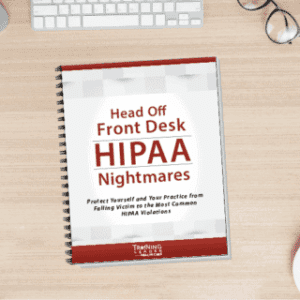
You could get hit with fines for violating HIPAA student health records’ rights unless you update your protocols based on new agency directives.
The U.S. Department of Health and Human Services (HHS) and the U.S. Department of Education (DOE) updated HIPAA and privacy act laws on how to maintain students’ health records.
Some situations allow disclosure – you might be surprised what ones are permissable. Keep your practice compliant when staff disclose minor’s medical records by using the below guide.
What Is Protected Under HIPAA Student Health Records?
HIPAA prevents the disclosure of protected health information (PHI) to any third parties unless the minor or their representative authorize permission in writing. Under HIPAA, protected information and records include and exclude the following:
- Any individually identifiable health information used, stored, or transmitted by a HIPAA-covered entity, in any form or media.
- The information can be health records, lab test results, or any medical documentation that has any patient identifier such as a social security number, birth date, or any data that identifies the individual.
- Education records are specifically excluded from the definition of PHI.
HIPAA requires consent before disclosure to a non-eligible party, but with the flexibility to disclose either PII or PHI under limited circumstances that specifically threaten the health or safety of individuals in the school or community.
Does HIPAA Allow Disclosing a Minor’s Substance Abuse to the Parent?
Disclosing PHI about a minor child with a mental health condition and/or substance use disorder to the parents of the minor is generally allowed provided state or other law don’t supersede HIPAA. In some cases, a minor receiving treatment without a parent’s consent may not be considered the minor’s personal representative.
But even in such cases HIPAA may allow for disclosure of the minor’s information to a parent. For instance, if the minor tells a physician he plans to harm himself or others, the physician can contact a parent or another individual who the provider believes can lessen or prevent the harm.
Does HIPAA Allow a Provider to Disclose PHI to a School Nurse?
Yes. Health care providers can disclose PHI to school nurses or other physicians for treatment purposes without the minor’s or parental authorization. Examples include sharing PHI with a school nurse who will administer student medication or tend to the student’s health care needs during school hours.
HIPAA also allows PHI disclosure to an individual if the physician believes it’s necessary to prevent or lessen a serious and imminent threat and the parent or person the information is being disclosed to is the person who can lessen the threat. For example, if a parent tells their child’s therapist the child threatened to kill a teacher and has access to a weapon, HIPAA permits the therapist to contact school officials if the therapist believes this is credible information.
Does HIPAA Allow Imminent Danger Info-Sharing?
HIPAA allows disclosing PHI (including psychotherapy notes) when the individual is acting on a good faith belief with credible representation that the disclosure is necessary to prevent harm or lessen a serious and imminent threat to the health or safety of the patient or others, and the disclosure is made to a person or who can prevent or lessen the threat, such as law enforcement, family, etc.
More frequently asked questions and information on HIPAA and the Family Educational Rights and Privacy Act (FERPA) FERPA is available in the joint guidance and on the HHS website.
Takeaway 1: HIPAA requires consent before sharing PHI. The guidance provides specific examples of emergency situations when healthcare providers can disclose a minor’s information to individuals in position to prevent or lessen the harm.
Takeaway 2: HIPAA violations can rack up enormous penalties fast, especially when you add the complexities of treating pediatric and adolescent patients.
The good news is, that will a little expert advice, you can avoid common HIPAA pitfalls related to minor patients. This is where healthcare attorney, Gina L. Campanella, Esq., FACHE, can help during her online training session.
Check Out Our Entire HIPAA Library
-
 Head Off HIPAA Front Desk Nightmares$247.00 – $257.00
Head Off HIPAA Front Desk Nightmares$247.00 – $257.00 -
 Head Off Front Desk HIPAA Nightmares$197.00
Head Off Front Desk HIPAA Nightmares$197.00 -
 Head Off Costly HIPAA Violations for Minor Patients$277.00 – $917.00
Head Off Costly HIPAA Violations for Minor Patients$277.00 – $917.00
